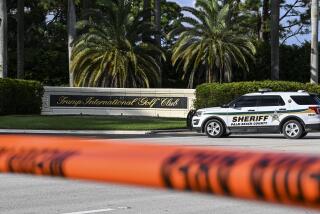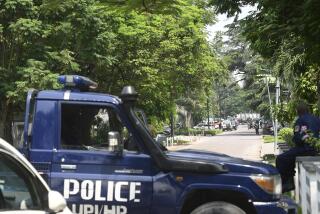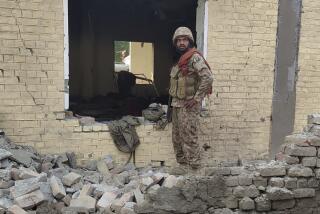FBI Joins Inquiry Into Blasts Aimed at Pakistani Leader
ISLAMABAD, Pakistan — As FBI agents joined the investigation of the attempted assassination of President Pervez Musharraf this week, Pakistani authorities said Friday that they had identified at least two of the attackers and confirmed that there was a third.
Interior Minister Faisal Saleh Hayat said the attackers belonged to an extremist group, which he said he would not name in order to protect the ongoing investigation. There were conflicting reports on whether investigations had concluded that one of the bombers was a foreigner.
Information Minister Sheik Rashid Ahmed told reporters that one of the suicide bombers appeared to be a foreigner.
Hayat said the face of one suicide attacker was intact, and by identifying him, authorities learned who one of his accomplices was. “The bodies of three suicide attackers have been found,” Hayat told Pakistan’s Senate on Friday.
At least 14 people died in the attack Thursday, and 46 were wounded, but Musharraf escaped unharmed. Only the window of his armored limousine was damaged.
Two minivans packed with explosives tried to ram Musharraf’s motorcade as he returned to a heavily fortified army base in Rawalpindi, a garrison town near Islamabad, Pakistan’s capital. As chief of army staff, Musharraf has an official residence on the military compound.
Pakistani investigators said they were exploring several theories, including the possibility that someone in the military leaked information about Musharraf’s itineraryto terrorists, sources said.
The failed assassination attempt Thursday was the second on the same route in 11 days, and the third known attempt on Musharraf’s life since he joined the U.S.-declared war on terrorism in late 2001.
Musharraf, a combat veteran who came to power in a bloodless 1999 coup, said the latest attacks had only stiffened his resolve to eradicate extremism in Pakistan.
“I fought wars, I fought a lot of skirmishes also -- I don’t run away,” he said in an interview broadcast on state television Thursday night, hours after the attempt on his life.
Musharraf’s critics in the mainstream opposition said his three crackdowns on extremist groups in the last two years weren’t serious efforts to permanently dismantle such organizations.
Officials in neighboring India and Afghanistan both accuse Musharraf’s government of playing a double game. They say Pakistan is giving sanctuary and support to guerrillas fighting Indian rule in the disputed state of Jammu and Kashmir and to Taliban fighters attacking U.S. and Afghan forces in Afghanistan.
Pakistani officials deny those claims.
Pakistan’s two biggest intelligence agencies, Military Intelligence and the Inter-Service Intelligence, have started investigations of the suicide attacks.
Agents from the FBI are conducting a separate inquiry. On Friday, unidentified FBI personnel visited the site of Thursday’s twin blasts and collected pieces of the vehicles used.
Investigators have found the license plates of the two vehicles, which were registered in Pakistan’s North-West Frontier Province. Support for Islamic extremist groups is strong in the province, especially among Pushtun tribesmen sympathetic to members of the deposed Taliban regime in Afghanistan and their Al Qaeda allies.
By late Friday, law enforcement agencies had not attempted to arrest any suspects in Thursday’s attack.
Pakistani government officials have not publicly blamed Al Qaeda, but they are not ruling out the possibility that Osama bin Laden’s terrorist network was behind the assassination attempt.
Bin Laden’s top lieutenant, Egyptian Ayman Zawahiri, called on Pakistani soldiers to topple Musharraf in an audiotape broadcast by the Arabic satellite television news channel Al Jazeera in September.
Hayat said after Thursday’s attack that there would be an overhaul of Musharraf’s security detail. A special security department is being established to protect the president and prime minister, Hayat said.
Any new security measures will face an early test. Musharraf is scheduled to play host to regional leaders, including Indian Prime Minister Atal Behari Vajpayee, at a two-day summit beginning Jan. 4 in Islamabad.
More to Read
Sign up for Essential California
The most important California stories and recommendations in your inbox every morning.
You may occasionally receive promotional content from the Los Angeles Times.










